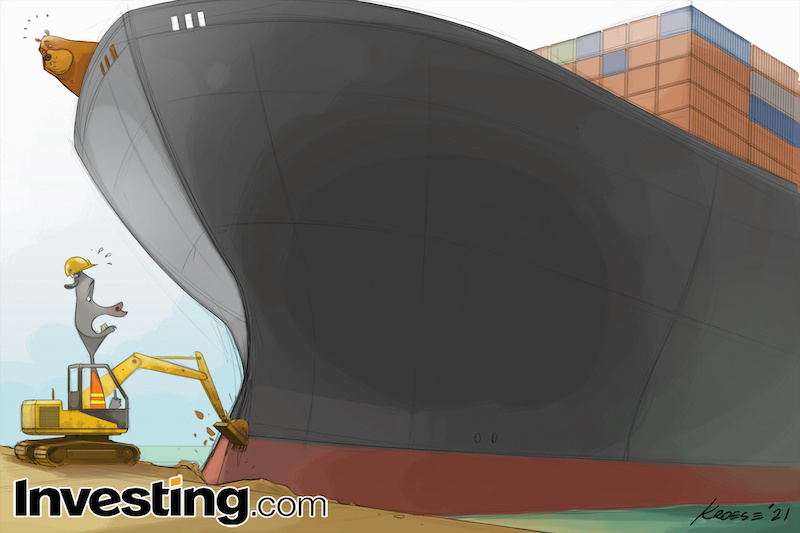Broadcom named strategic vendor for Walmart virtualization solutions
By Geoffrey Smith
Investing.com -- The blocking of the Suez Canal last week threw up some big numbers, although perhaps none bigger than the number of Internet memes it generated.
Suez carries about 12% of global trade, including 1 million barrels of oil and refined product a day, and about 8% of the world’s trade in liquefied natural gas. Over 19,000 ships sailed through it in 2019, carrying 1.25 billion tons of cargo.
Lloyds List, the specialist shipping insurance publication, estimated that some $9.6 billion of goods passes through the canal each day. Multiply that by the (effectively) seven days during which passage was interrupted and you get some $70 billion worth of trade immediately affected.
And yet, the world’s consumers are unlikely to notice much was wrong. That running machine may take another week to arrive, that next fill-up at the gas station may cost a little more (especially in Europe), but most of the goods in transit will keep most of their value for that extra week, and the losses, such as they are, will be spread thinly around a global market that is much, much bigger than the numbers seized on by delighted hacks and editors.
“Coping mechanisms are in place,” said analysts at Euler Hermes, a trade insurance specialist arm of Allianz, in a blog post at the end of last week. They estimated that a week of closure would shave no more than 0.4% off this year’s world trade growth.
The real trouble with the Suez incident, they argued, is that it is “the straw that breaks the camel’s back”, coming on top of myriad other strains generated by the pandemic. Average input prices in the Eurozone rose at the sharpest rate for a decade in March, according to IHS Markit. Supplier delivery times lengthened to the greatest extent in Markit’s 23-year survey history. In the U.S., likewise, the Institute of Supply Management’s prices paid sub-index hit a 13-year high in March.
Those dry statistics have now been made flesh in an image that is concrete and immediately understandable to every person alive. The fear is that such disruptions, combined with the ultra-loose monetary policies of global central banks, will combine to start a damaging inflationary spiral.
Such fears may be overdone, but the image of that impotent backhoe scraping away the dirt from the ship towering over it will inform future political debate over the merits of ‘reshoring’ production after three decades of relocating it to China. It makes legislation sponsoring local production – whether semiconductors in the U.S., or vaccine ingredients in Europe – more likely to pass wherever it is proposed.
Trade economists, who prize the general above the specific, will see this as a bad thing. They argue that such localization is inefficient. Companies will need higher levels of working capital to sustain them, reducing their profitability. That’s bad for stock prices, and bad for bonds too, in so far as companies will do their best to push out higher input costs onto consumers.
Opponents of globalization, mainly in the rich world, will say the gains from such efficiencies aren’t worth defending anyway. They haven’t benefited enough people, and the losses will be felt only by the 1% creaming off the super-profits of modern technology, they argue.
A quick check of everything around you in your home should tell you that the latter, at least, are wrong. How much more would you have had to pay for all those goods if they had been made in Germany, Britain or the U.S.? And yet the trade economists are also guilty of overlooking the failure of western governments to comfort and retrain those dislocated by decades of offshoring, as electoral trends over the last 10 years have shown.
It may still be impossible to turn a 400-meter ship around in a trench only 300 meters wide. But the juggernaut of global trade, while unwieldy, is another thing entirely.
